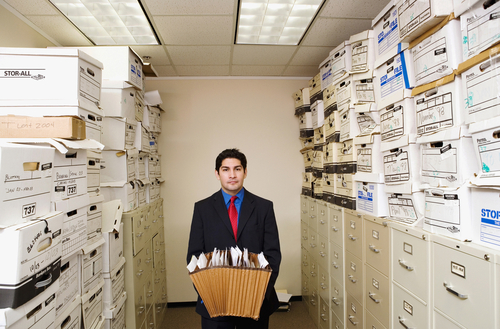
Posted September 29, 2022
6 Tips for Storing Business Files Off-Site Safely and Successfully
Off-site storage of your paper documents has never been easier or safer than it is today. But there are several things each business should take into consideration.
WHY SHOULD I STORE FILES OFF-SITE?
Storage facilities are less expensive than buying or leasing more square footage. Each file cabinet takes about 15 square feet of space. As your business grows, not only will it take on more employees, but also more paperwork. Which would you prefer to have on-site? Most opt to use their square footage for their people, and move their older paperwork into storage.
WHAT FILES AM I ALLOWED TO STORE OFF-SITE?
Depending on your type of business there are differing rules and regulations. If you are a medical or legal practice, the regulations tend to be tighter than other businesses. Some businesses and nonprofits house sensitive information. Often they require at least two locks before access. For example, a lock on your storage unit, AND a lock on the file cabinet inside the unit. Always check the regulations related to your specific industry.
WHEN SHOULD A FILE GO INTO STORAGE?
More than likely you can store anything over a year or two old if you aren’t regularly referencing it. However, there are several kinds of documents you will always want to keep on hand, namely any you are currently and actively using. This includes but is not limited to tax documents, articles of incorporation, your business plan, EIN documents, financial documents like invoices, statements, bills, and monthly financial reports, leases for your property, equipment, and anything else that will have a renewal, and finally HR and employee documents such as 401k, payroll, insurance and other benefits.
WHERE SHOULD I STORE THE FILES?
Paper files are particularly vulnerable. Even if your industry doesn’t have specific requirements, keep in mind that paper is susceptible to deterioration from moisture, extreme temperatures, mold, and pests. Storing paper files in a garage, basement, or attic is not ideal, and even risky. Look for a storage facility, particularly one that is climate-controlled. They take extra care on controlling humidity and pests, keeping your documents safe, clean, dry, and on one piece.
HOW SHOULD I STORE THE FILES?
There is an overwhelming tendency to store files in cardboard banker’s boxes. Don’t. Even in a climate controlled storage facility, stacking banker’s boxes makes it difficult to retrieve anything lower in the stack. Plus they heavier they get, the more likely the stack will topple or crumble. Opt for plastic lidded boxes and shelving units if at all possible. While your files should be safe in climate control, it is still a good practice to keep everything off of the concrete floor, especially if your unit opens directly to the outdoors. Bonus tips: develop a consistent naming and labeling system before moving the boxes into your unit. Then create a check-in and check-out log in order to know where the file went and how long it was out.
WHO SHOULD I CHOOSE TO USE TO STORE MY DOCUMENTS?
Clearly climate-controlled self storage units near you are going to be the most convenient. But they are not all created equally. Safety and security are two important measures to keep in mind when researching storage units. How many locks does someone have to go through to get into the facility and to my unit? Is there good lighting and cameras? How clean is it? What is the pest control schedule? What is the security protocol? At Sixty5 Self Storage, the safety and integrity of your files is our top priority. For more information visit our website and FAQ page. Or for a full list of our safety and security measures and facility amenities call or drop by. We would be happy to give you a tour.
Research notes: What are 5 tips for storing business files safely? Should a business store their files off site? What types of files are safe to store off site for a business? What types of files should never be stored off site? Instead of using bankers boxes or moving boxes, consider storing business files in file cabinets or fireproof, waterproof safes that can be locked. This provides an extra security step for your business documents on top of the security features offered by the self-storage facility you choose. Useful tips for
- Get climate controlled
- Ask about security measures - access code, double entry, cameras
- Sturdy lidded transparent boxes – label – shelves – in order alphabetically of by year/month
- Limit the number of people who have access
- Create a checkout log
Some businesses require double locks Use consistent labelling/naming/dating Keep on hand:
- Actively using
- Tax documents
- Entity - incorporation, business plan, ein
- Financial docs – invoices, statements, bills, monthly financial reports
- Leases – property, equipment, anything that will have a renewal
- HR and employee docs – 401k, payroll, benefits
Proper ventilation to prevent harmful compounds such as mold spores, ozone or nitrogen oxide Don’t leave your business files in cardboard boxes or plastic bins sitting on the ground Storing documents in a basement, garage, or attic will have a negative impact on the documents.
Make sure you know all of the rules that apply to each type of document depending on what information is on it. These regulations are particularly enforced when regarding medical and financial documents. Tax documents will also have strict storage rules too, so be sure to check with the governing bodies in your locality. Each cabinet requires about 15 square feet of space to be fully accessible
